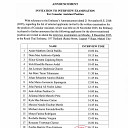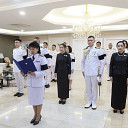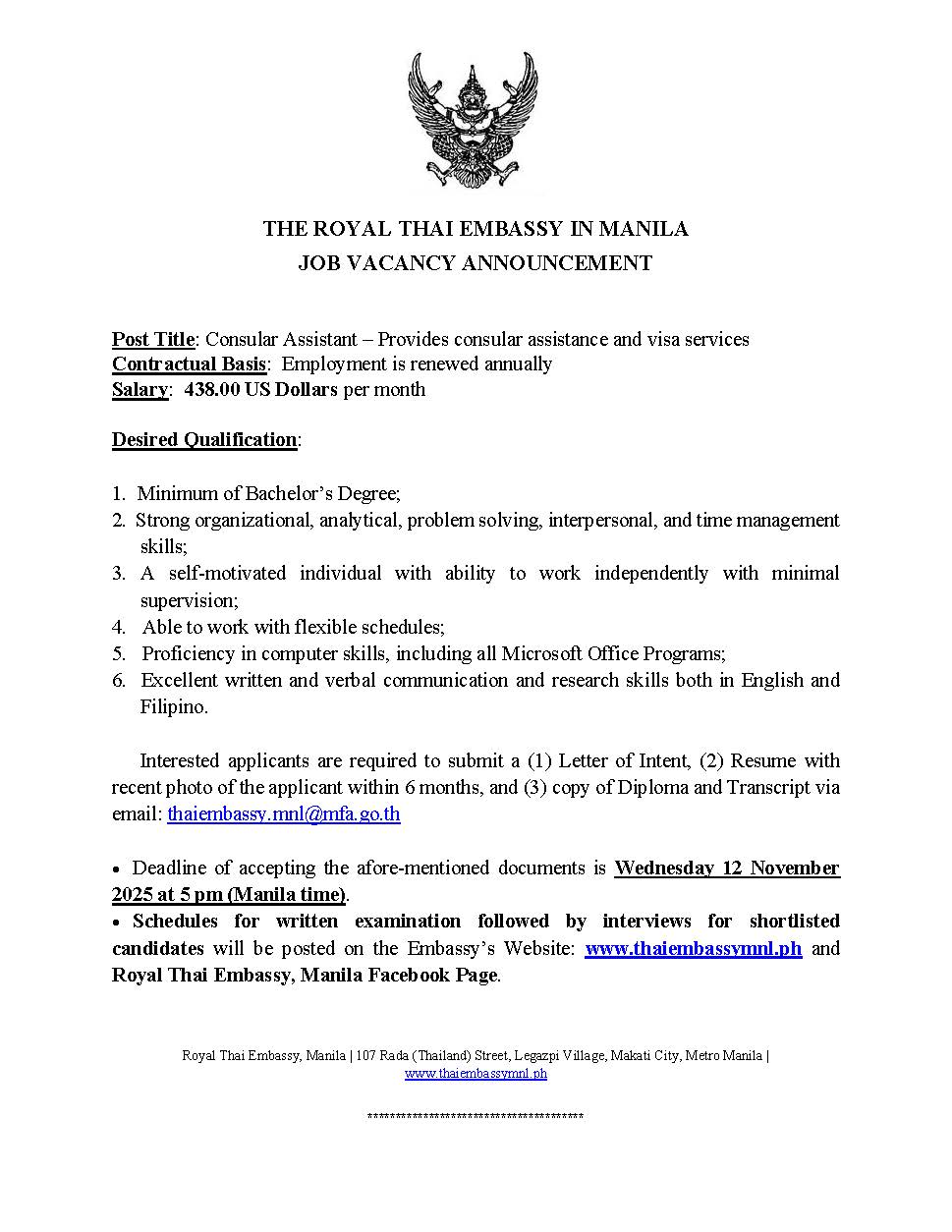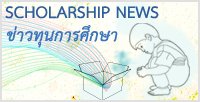เนื่องในโอกาสวันคล้ายวันพระบรมราชสมภพพระบาทสมเด็จพระบรมชนกาธิเบศร มหาภูมิพลอดุลยเดชมหาราช บรมนาถบพิตร วันชาติ และวันพ่อแห่งชาติ 5 ธันวาคม 2568 สถานเอกอัครราชทูต...
เนื่องในโอกาสวันคล้ายวันสวรรคตครบ 100 ปี พระบาทสมเด็จพระมงกุฎเกล้าเจ้าอยู่หัว 25 พฤศจิกายน 2568 และวันประสูติครบ 100 ปี สมเด็จพระเจ้าภคินีเธอ...
With reference to the Royal Thai Embassy's Announcement dated 21 November B.E. 2568 (2025), regarding the list of selected applicants invited to the written...
เมื่อวันที่ 30 ตุลาคม 2568 นางมาฆวดี สุมิตรเหมาะ เอกอัครราชทูต ณ กรุงมะนิลา พร้อมด้วยข้าราชการสถานเอกอัครราชทูตฯ ทีมประเทศไทยภาครัฐและภาคเอกชน พร้อมคู่สมรส...
Announcement
 With reference to the Royal Thai Embassy's Announcement dated 21 November B.E. 2568 (2025), regarding the list of selected applicants invited to the written examination for the position of Consular...
With reference to the Royal Thai Embassy's Announcement dated 21 November B.E. 2568 (2025), regarding the list of selected applicants invited to the written examination for the position of Consular... - 21 November 2025 Announcement for the position of Consular Assistant
- 08 November 2025 Temporary Suspension of Consular Services on 10 November 2025
- 01 November 2025 Job Vacancy Consular Assistant
- 22 July 2025 Temporary Closure of the Royal Thai Embassy on 23 July 2025
ข่าวกิจกรรม
สถานเอกอัครราชทูต ณ กรุงมะนิลา จัดพิธีถวายเครื่องราชสักการะและวางพานพุ่ม พิธีจุดเทียนถวายพระพรชัยมงคล และ การลงนาม ถวายพระพรชัยมงคล เนื่องในโอกาสวันเฉลิมพระชนมพรรษาสมเด็จพระนางเจ้าสิริกิติ์ พระบรมราชินีนาถ พระบรมราชชนนีพันปีหลวง เมื่อวันที่ ๑๒ สิงหาคม ๒๕๖
เนื่องในโอกาสวันเฉลิมพระชนมพรรษาสมเด็จพระนางเจ้าสิริกิติ์ พระบรมราชินีนาถ พระบรมราชชนนีพันปีหลวง วันที่ ๑๒ สิงหาคม ๒๕๖๗ สถานเอกอัครราชทูต ณ กรุงมะนิลา ได้จัดพิธีถวายเครื่องราชสักการะและวางพานพุ่ม พิธีจุดเทียนถวายพระพรชัยมงคล และการลงนามถวายพระพรชัยมงคล เมื่อวันที่ ๑๒ สิงหาคม ๒๕๖๗ เวลา ๑๐.๐๐ น. ณ ทำเนียบเอกอัครราชทูตฯ โดยมีนายตุลย์ ไตรโสรัส เอกอัครราชทูตฯ หัวหน้าสำนักงานทีมประเทศไทย และข้าราชการสถานเอกอัครราชทูตฯ และสำนักงานทีมประเทศไทย พร้อมคู่สมรส เข้าร่วม







สถานเอกอัครราชทูต ณ กรุงมะนิลา ได้จัดพิธีถวายเครื่องราชสักการะและวางพานพุ่ม พิธีถวายสัตย์ปฏิญญาณเพื่อเป็นข้าราชการที่ดีและพลังของแผ่นดิน เนื่องในโอกาสพระราชพิธีมหามงคลเฉลิมพระชนมพรรษา ๖ รอบ ๒๘ กรกฎาคม ๒๕๖๗
เนื่องในโอกาสพระราชพิธีมหามงคลเฉลิมพระชนมพรรษา ๖ รอบ ๒๘ กรกฎาคม ๒๕๖๗ สถานเอกอัครราชทูต ณ กรุงมะนิลา ได้จัดพิธีถวายเครื่องราชสักการะและวางพานพุ่ม พิธีถวายสัตย์ปฏิญญาณเพื่อเป็นข้าราชการที่ดีและพลังของแผ่นดิน พิธีจุดเทียนถวายพระพรชัยมงคล และการลงนามถวายพระพรชัยมงคล เมื่อวันที่ ๒๘ กรกฎาคม ๒๕๖๗ เวลา ๑๐.๐๐ น. ณ ทำเนียบเอกอัครราชทูตฯ โดยมีนายตุลย์ ไตรโสรัส เอกอัครราชทูตฯ หัวหน้าสำนักงานทีมประเทศไทย ข้าราชการสถานเอกอัครราชทูตฯ และทีมประเทศไทย พร้อมคู่สมรส เข้าร่วม






สถานเอกอัครราชทูต ณ กรุงมะนิลา จัดกิจกรรมจิตอาสาบำเพ็ญสาธารณประโยชน์และบำเพ็ญสาธารณกุศลเฉลิมพระเกียรติพระบาทสมเด็จพระเจ้าอยู่หัว เนื่องในโอกาสพระราชพิธีมหามงคลเฉลิมพระชนมพรรษา ๖ รอบ ๒๘ กรกฎาคม ๒๕๖๗
เมื่อวันที่ ๒๘ มิถุนายน ๒๕๖๗ สถานเอกอัครราชทูต ณ กรุงมะนิลา ได้จัดกิจกรรมจิตอาสาบำเพ็ญสาธารณประโยชน์และบำเพ็ญสาธารณกุศลเฉลิมพระเกียรติพระบาทสมเด็จพระเจ้าอยู่หัว เนื่องในโอกาสพระราชพิธีมหามงคลเฉลิมพระชนมพรรษา ๖ รอบ ๒๘ กรกฎาคม ๒๕๖๗ โดยร่วมปลูกต้นไม้พันธุ์หายากของฟิลิปปินส์ เฉลิมพระเกียรติฯ ณ สวนพฤกษศาสตร์ Makiling Botanic Gardens ของมหาวิทยาลัย University of the Philippines Los Baños (UPLB) โดยมีเอกอัครราชทูตฯ หัวหน้าสำนักงานทีมประเทศไทย ข้าราชการสถานเอกอัครราชทูตฯ ทีมประเทศไทย และผู้แทนภาคเอกชนไทยในฟิลิปปินส์ พร้อมคู่สมรส เข้าร่วม













สถานเอกอัครราชทูต ณ กรุงมะนิลา จัดกิจกรรมจิตอาสาบำเพ็ญสาธารณประโยชน์และบำเพ็ญสาธารณกุศลเฉลิมพระเกียรติสมเด็จพระนางเจ้า ฯ พระบรมราชินี เนื่องในโอกาสวันเฉลิมพระชนมพรรษา ๓ มิถุนายน ๒๕๖๗
เมื่อวันที่ ๒๘ มิถุนายน ๒๕๖๗ สถานเอกอัครราชทูต ณ กรุงมะนิลา ได้จัดกิจกรรมจิตอาสาบำเพ็ญสาธารณประโยชน์และบำเพ็ญสาธารณกุศลเฉลิมพระเกียรติสมเด็จพระนางเจ้า ฯ พระบรมราชินี เนื่องในโอกาสวันเฉลิมพระชนมพรรษา ๓ มิถุนายน ๒๕๖๗ โดยได้ร่วมปลูกต้นไม้พันธุ์หายากของฟิลิปปินส์ เฉลิมพระเกียรติฯ ณ ศูนย์ ASEAN Biodiversity Centre โดยมีเอกอัครราชทูตฯ หัวหน้าสำนักงานทีมประเทศไทย ข้าราชการสถานเอกอัครราชทูตฯ ทีมประเทศไทย และผู้แทนภาคเอกชนไทย ในฟิลิปปินส์ พร้อมคู่สมรส เข้าร่วม










งานเลี้ยงรับรองเพื่อเฉลิมฉลองโอกาสครบรอบ ๗๕ ปีการสถาปนาทางการทูตระหว่างไทยกับฟิลิปปินส์
เมื่อวันที่ ๑๔ มิถุนายน ๒๕๖๗ สถานเอกอัครราชทูต ณ กรุงมะนิลา ได้จัดงานเลี้ยงรับรองเพื่อเฉลิมฉลองโอกาสครบรอบ ๗๕ ปี การสถาปนาความสัมพันธ์ทางการทูตระหว่างไทยกับฟิลิปปินส์ ณ โรงแรมดุสิตธานี มะนิลา ซึ่งสถานเอกอัครราชทูตฯ ได้ร่วมกับ Department of Tourism (สนับสนุนการแสดงวัฒนธรรมฟิลิปปินส์) Office of Senator Juan Miguel Zubiri (สนับสนุนการสาธิตกีฬา Arnis จากPhilippine Eskrima Kali Arnis Federation) และ Office of Social Secretary (เดินแบบผ้าฟิลิปปินส์ผสมผสานผ้าไทย โดยนาย Paul Cabral ดีไซเนอร์ ฟิลิปปินส์) และมีนาง Louise Araneta-Marcos, First Lady นาย Enrique A. Manalo รัฐมนตรีว่าการกระทรวงการต่างประเทศฟิลิปปินส์ นาง Christina G. Frasco รัฐมนตรีว่าการกระทรวงท่องเที่ยวฟิลิปปินส์เป็นแขกเกียรติยศ และมีนาย Alexander G. Gesmundo ประธานศาลฎีกา ฟป. นาย Lucas Bersamin เลขาธิการประธานาธิบดีแห่งสาธารณรัฐฟิลิปปินส์ นาง Maria Antonia Yulo-Loyzaga รัฐมนตรีว่าการกระทรวง ทรัพยากรธรรมชาติและสิ่งแวดล้อมฟิลิปปินส์ นาง Amenah F. Pangandaman รัฐมนตรีว่าการกระทรวงงบประมาณและการจัดการฟิลิปปินส์ นาย Vincent D. Frasco รองประธานสภาและสมาชิกสภาผู้แทนราษฎรฟิลิปปินส์ นาย Jude Avorque Acidre สมาชิกสภาผู้แทนราษฎรฟิลิปปินส์ และรองผู้แทนเสียงข้างมากสภาผู้แทนราษฎรฟิลิปปินส์ นาย Rommel Francisco Marbil ผู้บัญชาการตำรวจฟิลิปปินส์ พลเอก Romeo S. Brawner Jr. ผู้บัญชาการทหารสูงสุดฟิลิปปินส์ รวมทั้งเอกอัครราชทูต คณะทูตานุทูต และคณะกงสุลกิตติมศักดิ์ประเทศต่าง ๆ ผู้บริหารหน่วยงานภาครัฐและภาคเอกชน ในฟิลิปปินส์เข้าร่วมงานประมาณ ๘๐๐ คน
ในโอกาสดังกล่าว เอกอัครราชทูต ณ กรุงมะนิลา และรัฐมนตรีกระทรวงการต่างประเทศฟิลิปปินส์ ได้กล่าวถึงความสัมพันธ์ที่ใกล้ชิดระหว่างไทยกับฟิลิปปินส์ ตลอด ๗๕ ปีที่ผ่านมา ทั้งในระดับทวิภาคี ที่มีความร่วมมือที่ใกล้ชิดทั้งในด้านการเมืองและความมั่นคง ด้านเศรษฐกิจ ด้านความสัมพันธ์ระหว่างประชาชนกับประชาชน ตลอดจนในระดับพหุภาคี ที่มีความร่วมมือที่แน่นแฟ้นผ่านเวที ASEAN และในกรอบสหประชาชาติ (UN) นอกจากนี้ เอกอัครราชทูตฯ ได้เน้นย้ำถึงแนวทาง Whole of Society Approach ที่ได้ใช้ในการส่งเสริมความสัมพันธ์ไทยและฟิลิปปินส์ ให้แน่นแฟ้นยิ่งขึ้น รวมถึงในการจัดกิจกรรมเฉลิมฉลองโอกาส ๗๕ ปี การสถาปนาความสัมพันธ์ โดยเน้นย้ำการมีส่วนร่วมของทุกภาคส่วน ไม่ว่าจะเป็นภาครัฐ ภาคเอกชน ภาคประชาสังคมและภาคประชาชน ซึ่งสะท้อนในการดำเนินโครงการ/กิจกรรมในช่วงที่ผ่านมา รวมถึงการจัดงานเลี้ยงรับรองในครั้งนี้ ซึ่ง สอท.ฯ ได้รับความร่วมมืออย่างดีจากภาครัฐและภาคเอกชนของทั้งไทยและฟิลิปปินส์ นอกจากนี้ ยังได้ใช้โอกาสกล่าวถึงและชื่นชม initiatives ของภาคเอกชนไทยที่ได้จัดกิจกรรมเพื่อฉลอง ๗๕ ปี ความสัมพันธ์ด้วย และรัฐมนตรีว่าการกระทรวงท่องเที่ยวฟิลิปปินส์ ได้กล่าวขอบคุณเอกอัครราชทูตฯ ที่ได้สนับสนุนและผลักดันความร่วมมือด้านการท่องเที่ยวระหว่างกันอย่างแน่นแฟ้น โดยประทับใจกับ Amazing Love ซึ่งจะส่งเสริมความสัมพันส์ระหว่างไทยและฟิลิปปินส์ให้แน่นแฟ้นในทุกระดับ















What's New
 เนื่องในโอกาสวันคล้ายวันพระบรมราชสมภพพระบาทสมเด็จพระบรมชนกาธิเบศร มหาภูมิพลอดุลยเดชมหาราช บรมนาถบพิตร วันชาติ และวันพ่อแห่งชาติ 5 ธันวาคม 2568 สถานเอกอัครราชทูต ณ กรุงมะนิลา...
เนื่องในโอกาสวันคล้ายวันพระบรมราชสมภพพระบาทสมเด็จพระบรมชนกาธิเบศร มหาภูมิพลอดุลยเดชมหาราช บรมนาถบพิตร วันชาติ และวันพ่อแห่งชาติ 5 ธันวาคม 2568 สถานเอกอัครราชทูต ณ กรุงมะนิลา... - 04 December 2025 The Royal Thai Embassy in Manila organized a ceremony on the occasion of the 100th anniversary of the passing of His Majesty King Vajiravudh, Rama VI, on 25 November 2025 and the 100th anniversary of the birth of Her Royal Highness Princess Bejaratana Raj
- 31 October 2025 The Royal Thai Embassy in Manila held a ceremony of paying tribute and signing of the Book of Condolences to Her Majesty Queen Sirikit The Queen Mother of the Kingdom of Thailand
- 22 October 2025 Her Excellency Mrs. Makawadee Sumitmor, Ambassador of the Kingdom of Thailand held a commemorative ceremony in remembrance of the passing of His Majesty King Chulalongkorn (King Rama V) on the occasion of King Chulalongkorn Memorial Day on 23 October 2025
- 20 October 2025 Her Royal Highness Princess Maha Chakri Sirindhorn graciously presided over the Awarding Ceremony of the 6th Princess Maha Chakri Award (PMCA) at IMPACT Arena, Exhibition and Convention Center, Muang Thong Thani, Nonthaburi, Thailand On 15 October 2025.

















